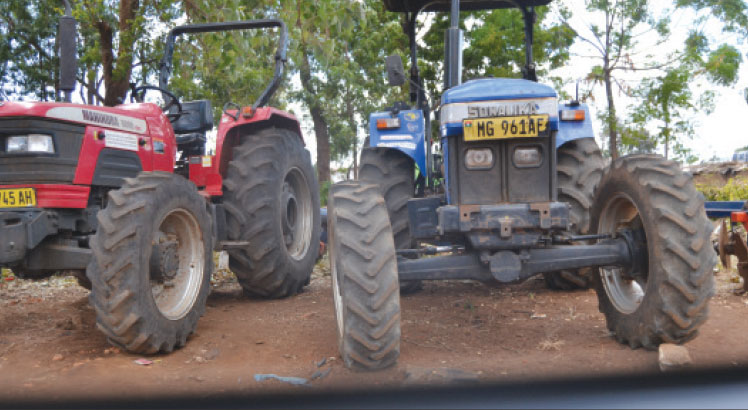56 % of Indian loan tractors grounded
As government begins repaying the K50 billion farm inputs loan from India, it has emerged that 56 percent of the remaining tractors that were procured through the facility are grounded.
Government distributed 101 tractors to the agriculture development divisions (ADDs) having sold 77 to politically connected people, stirring public outrage, Ombudsman’s investigation and court battles.
Recent revelations on the tractors come as the loan government secured from Exim Bank of India in 2011 to purchase agriculture equipment and machinery, has matured with government launching into the 25-year repayment.

The deal courted controversy after it was discovered that the Ministry of Agriculture sold tractors to politically connected people at reduced prices on grounds that they were archaic for the intended purpose of enhancing mechanisation among smallholder farmers.

Ministry of Agriculture spokesperson Gracian Lungu confirmed that of the available 92, 52 are not operational.
“Some have been down for two years and others three years…We may need a good amount of money to maintain these tractors and their accessories. Currently, we are planning to conduct an assessment on the exact amount,” he said.
In a written response, Lungu said they have proposed to the Ministry of Finance to set up a scheme to raise funds for the maintenance of the tractors.
“We are engaging the Treasury to allow resumption of the tractor hiring scheme where funds generated from hiring of this machinery will be deposited and when they develop some faults, we can easily maintain them,” he said.
The ADDs overseeing agriculture in the rest of the country’s 28 districts are Lilongwe, Blantyre, Karonga, Machinga, Salima, Mzuzu, Shire Valley and Kasungu.
There are 40 functional tractors with Kasungu having the highest number at nine while Shire Valley has four, the lowest tally, according to the ministry’s statistical breakdown we have seen.
Lungu dismissed assertions that the development will derail agriculture mechanisation push.
“We have also made a deliberate move under the Agriculture Commercialisation project to allow cooperatives which are into crop production to be provided special funds for tractor procurement.
“Through this, we have seen a number of cooperatives having tractors and their accessories,” he said.
Lilongwe University of Agriculture and Natural Resources economics lecturer Henry Kankwamba said the illegal sale of the tractors and mismanagement at ADD level could lead the country to repaying a loan that has not benefited the nation.
“The sale of the tractors at low costs was a typical example of State capture. Again, we have a very terrible record of maintaining our infrastructure to an extent that the possibility that some of those tractors might not have been serviced over all these years.
“I propose that the funding for maintaining such machinery should be separate from those allocated to government vehicles to avoid cases where funds are prioritised on fixing the cars of the principal secretaries and a tractor is the last option,” he said.
Kankwamba also argued that agriculture authorities jumped processes when procuring tractors for smallholder farmers.
“What we could have done is to re-organise our farmers into clubs or cooperatives and then these groups should be the ones hiring the tractors.
“That said, dispatching the tractors at the ADDs is a very good idea and it can improve productivity by taking off some of the drudgery from family labour or hired labour,” he said
The lecturer, however, said for the machinery to be properly maintained, these cooperatives are supposed to be handed a greater portion of control in the tractors’ operationalisation.
“The smallholder farmers cooperatives or clubs themselves can also contribute greatly to the tractors’ durability through contributing periodic maintenance fees.
“And because they are putting in their own money then accountability is going to be very key because it is the same farmers that can stage a protest upon the misuse of that resource,” Kankwamba reasoned.
In an earlier interview with our sister paper The Nation, Ministry of Finance and Economic Affairs spokesperson Taurai Banda said the country is expected to pay about $58 million (about K58 billion) to clear the loan.
He said: “The loan has an average interest rate of 1.5 percent per annum. The loan has a repayment period of 25 years, including a grace period of four years.
“The loan is being serviced from the consolidated account of the Malawi Government, just like any other loan.”





